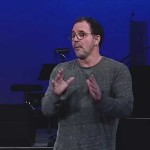We run our website the way we wished the whole internet worked: we provide high quality original content with no ads. We are funded solely by your direct support. Please consider supporting this project.
God Does Not Always Get What He Wants
One of the ways the Bible makes it clear that humans have free will and that God doesn’t predetermine human decisions is found in the responses God has toward human choices. Scripture consistently depicts God as being frustrated by the way his people obstinately resist his plans and Scripture often depicts God’s heart as breaking over people’s stubborn refusal to choose the way of life. The pain of God’s heart over human rebellion is clearly revealed in Jesus as he laments over Jerusalem:
Jerusalem, Jerusalem, the city that kills the prophets and stones those who are sent to it! How often have I desired to gather your children together as a hen gathers her brood under her wings, and you were not willing! (emphasis added Matt. 23:37)
Christ, who is our picture of God, earnestly longs for everyone in the city of Jerusalem to come to him and receive the life he has to offer. But, even though he is the Son of God, he could not force the people he loves to turn to him. Whether they did so or not was up to them.
Examples of God’s grief over the free choices of humans abound in Scripture. In the words of the Lord as he speaks about a judgment he is bringing on Israel in Ezekiel 22, it reads, “I soughtfor anyone among them who would repair the wall and stand in the breach before me on behalf of the land, so that I would not destroy it,” the Lord cries. But unfortunately, he concludes, “I found no one. Therefore I have poured out my indignation upon them…” (Ezek. 22:30–31).
This passage is a remarkable testimony to the urgency of prayer, but it also shows the importance of freedom in general. If anyone had chosen to heed the Lord’s earnest attempt to raise up an intercessor, the disaster that befell Israel would have been avoided. To the Lord’s great disappointment, however, no one responded to God’s promptings.
Along the same lines, a number of biblical passages describe God as experiencing sorrow at the way things turned out because of human decisions. For example, in the light of the depravity that characterized humanity prior to the flood, the Bible says “The Lord was sorry that he made humankind on the earth, and it grieved him to his heart” (Gen. 6:6). If everything happens according to God’s plan, then God must have willed humans to sink to the pathetic level of depravity we find them prior to the flood. But if God in any sense willed this depravity, how could God genuinely regret the way his creations turned out? (Other examples can be found in Exod. 34:9; 33:3,5; Deut. 9:6, 13; 10:16; 31:27; Judges 2:19; 2 Kings 17:14; 2 Chron. 30:8; 36:13; Ne 9:16; Isa. 46:12; 48:4; Jer. 7:26; Hos. 4:16).
Nowhere is our ability to freely thwart God’s purpose and grieve God’s heart more evident than in our capacity to bring permanent destruction upon ourselves. The Bible teaches that God desires every person to accept his love and be saved (e.g. 1 Tim 2:4, 4:10; 2 Pet 3:9; cf. Ezek 18:23, 32; 33:11). There is no partiality in God that leads him to love one person more than another, or to arbitrarily select some for salvation rather than others (Deut 10:17; 2 Chron 19:7; Ac 10:34; Rom 2:11; Ja 3:17). God wants all to be saved and he created them with the sincere hope that they would be saved.
Yet, the Bible also makes it clear that many people refuse this. Even though Jesus died “for the sins of the whole world” (I Jn 2:2), and even though God is always working in people’s hearts to influence them to accept him, some people “love darkness rather than light” (Jn 3:19). Because people must be free if love is to be genuine, they have the capacity to thwart God’s will and bring destruction upon themselves.
When people refuse God’s plan for their lives, it is not because their destruction fits into God’s mysterious plan for creation. To the contrary, throughout their lives God tries to save them – which is why he is frustrated with their obstinacy. “All day long,” the Lord says, “I have held out my hands to a disobedient and contrary people” (Rom 10:21). God truly grieves when the people he loves and tries to influence to come into his eternal kingdom choose to resist him.
These and similar passages demonstrate that God does not always get what he wants for he gave people free will. God created us with the capacity to receive and reflect his love back to him and to each other as well as toward the animal kingdom and the earth. But because we’re talking about love, God couldn’t preprogram us to cooperate with God’s plan. We have the capacity to thwart God’s will, within limits. And when we do, it breaks God’s heart.
Category: General
Tags: Choice, Free Will, God's Will, Love, Problem of Evil, Salvation
Topics: Providence, Predestination and Free Will
Related Reading

Enduring an Evil-Infested World (6 Principles) —part two
In the previous post, I introduced the first three principles that will help you find peace and even a sense of victory in the midst of the evil we face in this world. Here are the final three. Principle #4: Let Go of the “Why” Question and Confront Evil In the midst of suffering, we…

In Darkest Times, God is Present
“However much evil was there, it would have been far worse if God was not there pushing back on it.” There is never a time when God is not present, no matter how bad the situation. In this short sermon clip, Greg Boyd talks about how we need to be watchful of the spirit world…

Is God Personal?
Hamed Saber via Compfight How can we trust that God is personally involved in our lives? Are our seemingly “small” lives significant enough for God to get involved when you consider the vastness of all that goes on in the cosmos. These are common question raised by skeptics and seekers. In Letters from a Skeptic,…

Challenging the Habit of Judgment
Jesus said, “Do not judge, or you too will be judged. For in the same way you judge others, you will be judged, and with the measure you use, it will be measured to you” (Matt 7:2). In our world where we encounter a nearly constant stream of judgments on social media or the news,…

Love and Free Will
God could have easily created a world in which nothing evil could ever happen. But this world would not have been capable of love. God could have preprogrammed agents to say loving things and to act in loving ways. He could even have preprogrammed these automatons to believe they were choosing to love. But these…

Arbitrary Election
Micah J. Murray wrote a blog entitled Five Reasons I Reject Unconditional Election, which was a response to John Piper’s recent arguments for embracing unconditional election. If you’re looking for Scripture-based argumentation, you would do well to look elsewhere (as Micah freely suggests) but if you’re looking for the deep down, intuitive and honest gut stuff,…

